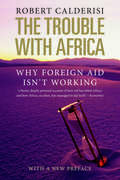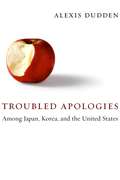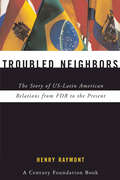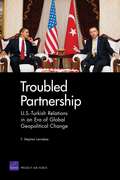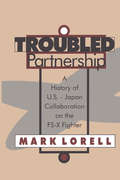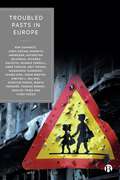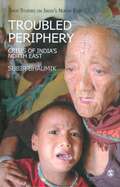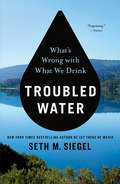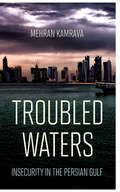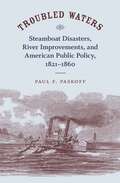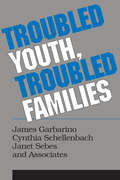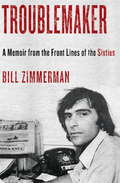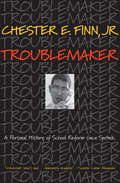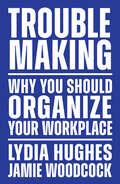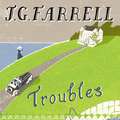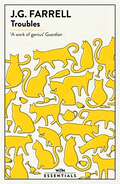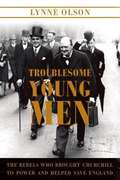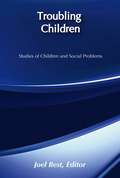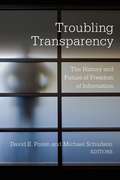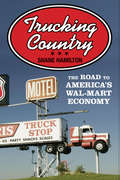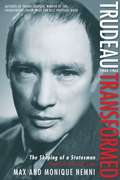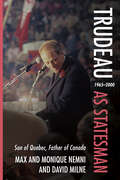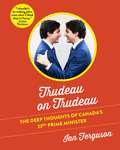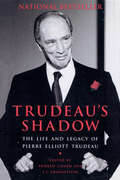- Table View
- List View
Trouble with Africa
by Robert CalderisiCalderisi shows that Africa has steadily lost markets by its own mismanagement; that corrupt, dictatorial regimes have hobbled agriculture, enterprise and foreign investment; that African family values and fatalism are more destructive than tribalism; and that African leaders prey intentionally on Western guilt. Calderisi exposes the shortcomings and indulgences of foreign aid and debt relief, and proposes his own radical solutions. Drawing on many years of first hand experience, The Trouble with Africa highlights issues which have been ignored by Africa's leaders but have long worried ordinary Africans, diplomats, academics, business leaders, aid workers, volunteers and missionaries. It ripples with stories which only someone who has talked directly to African farmers--and heads of state--could recount. Calderisi's aim is to move beyond the hand-wringing and finger-pointing which dominates most discussions of Africa. Instead, he suggests concrete steps which Africans and the world can take to unlock the talent and enterprise of the continent. 'boisterous, entertaining and highly accessible. [Calderisi] challenges the shibboleths of the aid industry with courage, compassion and humour. A timely and bracing read.'--Michela Wrong, Author of In the Footsteps of Mr. Kurtz'A timely, intriguing and provocative book. The author's love of the continent shines through every line, yet his bold suggestions will raise eyebrows and provoke debate.' -- Baroness Lynda Chalker, former UK Secretary of State for Overseas Development'a blast of fresh air over a continent that has for decades been suffocating under a blanket of well-meant concern, ineffectual at best, and harmful at worst'--Michael Holman, former Africa editor, Financial Times
Troubled Apologies Among Japan, Korea, and the United States
by Alexis DuddenWhether it's the Vatican addressing its role in the Second World War or the United States atoning for its treatment of native Hawai'ian islanders, apologizing for history has become a standard feature of the international political scene. As Alexis Dudden makes clear, interrogating this process is crucial to understanding the value of the political apology to the state. When governments apologize for past crimes, they take away the substance of apology that victims originally wanted for themselves. They rob victims of the dignity they seek while affording the state a new means with which to legitimize itself.Examining the interplay between political apology and apologetic history, Dudden focuses on the problematic relationship binding Japanese imperialism, South Korean state building, and American power in Asia. She examines this history through diplomatic, cultural, and social considerations in the postwar era and argues that the process of apology has created a knot from which none of these countries can escape without undoing decades of mythmaking.
Troubled Neighbors: The Story of US-Latin American Relations from FDR to the Present
by Henry RaymontAt one time the US and Latin America defined themselves in common as new and American, in contrast to the old, European order, and they enjoyed a period of friendship and cooperation based on that sustaining sense of commonality. With the advent of the Cold War, however, hemispheric solidarity and alliance faded fast, as the US became preoccupied with other regions of the world it deemed of deeper strategic significance. The United States and Latin America now largely define each other as negative reference points, instead of as neighbors and allies. In Troubled Neighbors, Henry Raymont-journalist for four decades, author, lecturer, teacher, and consultant-presents a journalist's observations on the pendulum swings in US-Latin American relations over the past half-century. The book is organized chronologically, with a chapter devoted to each of the administrations from FDR to Bill Clinton and an epilogue covering the first term of the George W. Bush administration. Straightforward organization: The book is chronologically organized, with a chapter devoted in turn to each administration from FDR to George W. Bush. Experienced author, an expert in the field.
Troubled Partnership
by F. Stephen LarrabeeU.S.-Turkish relations, long a vital element of U.S. policy, have seriously deteriorated in recent years. However, the arrival of a new U.S. administration offers an opportunity to repair recent fissures. Priority should be given to harmonizing policy toward Iraq and the Middle East as well as Central Asia and the Caucasus.
Troubled Partnership: History of US -Japan Collaboration on the FS-X Fighter
by Mark LorellDuring World War II. Japanese fighters, such as the famed Zero, were among the most respected and feared combat aircraft in the world. But for decades following the defeat of Japan in 1945, a variety of political and economic factors prevented Japan from developing its own modern national fighter. This changed in the 1980s. Japan began independently developing its first world-class fighter since World War II. After several years of contentious negotiations, the Japanese agreed to work with the United States to cooperatively develop a minimally modified F-16, the FS-X. The new fighter, however, has evolved into a world-class aircraft developed largely by Japanese Industry primarily due to errors committed by the U.S. side. By the fall of 1995, fifty years after the end of World War II, the Zero for the 1990s will have made its first flight, catapulting Japan into the elite ranks of nations capable of developing the most advanced weapon systems. In Troubled Partnership, Mark Lorell traces the evolution of the FS-X, disclosing the conflicting economic and security objectives advanced by U.S. officials, the flawed U.S. policy of technology reciprocity, and the challenges of International collaboration. Its deep Intimacy with the Interplay of policy and economy will make this volume of Intense Interest to political Scientists, military studies specialists, historians, and government officials.
Troubled Pasts in Europe: Strategies and Recommendations for Overcoming Challenging Historic Legacies
by Rok Zupančič Seamus Farrell Faris Kočan Kenneth Andresen Katarzyna Bojarska Ricardo Dacosta Anke Fiedler Abit Hoxha Nikandros Ioannidis Niamh KirkBased on the findings of a major research project, this book investigates how European societies confront their troubled pasts today. In particular, the text explores what kinds of measures can be taken and which strategies endorsed to facilitate the process of overcoming difficult historic legacies in seven European states: Kosovo, Bosnia and Herzegovina, Germany, Ireland, Spain, Cyprus and Poland. The book is written by an international team of experts and examines strategies and actions in both policy making and civil society of European countries, as well as throughout the EU as a collective.
Troubled Periphery: The Crisis of India′s North East (SAGE Studies on India′s North East)
by Subir BhaumikThis book maps the evolution of India′s North East into a constituent region of the republic and analyses the perpetual crisis in the region since Independence. It highlights how land, language and leadership issues have been the seed of contention in the North East and how factors like ethnicity, ideology and religion have shaped the conflicts. It also throws light on the major insurgencies, internal displacements, protest movements and the regional drug and weapons trade in the region. It examines ′the crisis of development′ and the evolution of the polity before offering a policy framework to combat the crises. The book includes a large body of original data, documentation and field interviews with major players as well as stakeholders. It is an important reference resource for students of politics and international relations, especially for those involved in South Asian studies and conflict studies. It is also an informative read for decision-makers, bureaucrats dealing with the North East and those involved in counter-insurgency operations in the area.
Troubled Water: What's Wrong with What We Drink
by Seth M. SiegelNew York Times bestselling author Seth M. Siegel shows how our drinking water got contaminated, what it may be doing to us, and what we must do to make it safe. If you thought America’s drinking water problems started and ended in Flint, Michigan, think again. From big cities and suburbs to the rural heartland, chemicals linked to cancer, heart disease, obesity, birth defects, and lowered IQ routinely spill from our taps. Many are to blame: the EPA, Congress, a bipartisan coalition of powerful governors and mayors, chemical companies, and drinking water utilities—even NASA and the Pentagon. Meanwhile, the bottled water industry has been fanning our fears about tap water, but bottled water is often no safer.The tragedy is that existing technologies could launch a new age of clean, healthy, and safe tap water for only a few dollars a week per person. Scrupulously researched, Troubled Water is full of shocking stories about contaminated water found throughout the country and about the everyday heroes who have successfully forced changes in the quality and safety of our drinking water. And it concludes with what America must do to reverse decades of neglect and play-it-safe inaction by government at all levels in order to keep our most precious resource safe.
Troubled Waters: Insecurity in the Persian Gulf (Persian Gulf Studies)
by Mehran KamravaTroubled Waters looks at four dynamics in the Persian Gulf that have contributed to making the region one of the most volatile and tension-filled spots in the world. Mehran Kamrava identifies the four dynamics as: the neglect of human dimensions of security, the inherent instability involved in reliance on the United States and the exclusion of Iraq and Iran, the international and security policies pursued by inside and outside actors, and a suite of overlapping security dilemmas. These four factors combine and interact to generate long-term volatility and ongoing tensions within the Persian Gulf.Through insights from Kamrava’s interviews with Gulf elites into policy decisions, the consequences of security dilemmas, the priorities of local players, and the neglect of identity and religion, Troubled Waters examines the root causes of conflicts and crises that are currently unfolding in the region. As Kamrava demonstrates, each state in the region, including Saudi Arabia, Iran, and Qatar, has embarked on vigorous security-producing efforts as part of foreign policy, flooding the area with more munitions—thereby increasing insecurity and causing more mistrust in a part of the world that needs no more tension.
Troubled Waters: Steamboat Disasters, River Improvements, and American Public Policy, 1821--1860
by Paul F. PaskoffIn Troubled Waters, Paul F. Paskoff offers a comprehensive examination of the federal government's river improvements program, which aimed to reduce hazards to navigation on the great rivers of America's interior during the early and mid-nineteenth century. Danger on the rivers came in a variety of forms. Shoals, rapids, ice, rocks, sandbars, and uprooted trees and submerged steamboat wrecks lodged in river beds were the most common perils and accounted for the largest number of steamboat disasters. This daunting array of river hazards required a similarly broad range of efforts to remove or at least ameliorate them. Against a variety of obstacles -- natural, political, and technological -- the river improvements program succeeded in reducing the rate of steamboat loss, even as steamboat traffic dramatically increased. Its success, Paskoff argues, demonstrates that the federal government was far more active than generally thought in promoting economic growth and development in the years leading up to the Civil War.The river improvements program was one of the most volatile issues in national, sectional, and state politics, touching on questions of economic development, constitutional law, partisan politics, and sectional rivalry. Paskoff examines the controversial program from its beginnings during the early republic to 1844, giving careful attention to the policies of Andrew Jackson's administration. He explores the array of objections to the program -- some grounded in a strict interpretation of the Constitution and others in a concern over alleged federal wantonness, corruption, and waste -- and follows the political story through the administration of James K. Polk forward to secession. Paskoff also explains the fiscal, economic, and technological aspects of the hazard problem and its solution, analyzing the federal government's fiscal condition, its capacity to undertake such an ambitious program, and the influence of conditions in the larger economy, including effects of the Mexican War, upon the federal government's finances.Paskoff's lively analysis rests on a bedrock of impressive quantitative evidence, including databases containing every documented steamboat wreck -- more than 1,200 -- on American rivers, lakes, and coastal waters; construction and engine data for more than 600 steamboat packets; and all relevant federal appropriations and expenditures measures, more than 2,300 spending projects in all. Vigorously researched and vividly told, Troubled Waters is an essential contribution to the history of internal improvements in the antebellum United States.
Troubled Youth, Troubled Families: Understanding Families at Risk for Adolescent Maltreatment
by Cynthia SchellenbachThe 1970s witnessed a growing concern and awareness regarding child abuse, an awareness which gradually extended to include the maltreatment of adolescents. In the 1980s a number of intervention projects dealing with this particular problem were started. Troubled Youth, Troubled Families is one of the first full-length reports to deal with adolescent abuse.
Troublemaker: A Memoir from the Front Lines of the Sixties
by Bill ZimmermanThe political memoir as rousing adventure story--a sizzling account of a life lived in the thick of every important struggle of the era. April 1973: snow falls thick and fast on the Badlands of South Dakota. It has been more than five weeks since protesting Sioux Indians seized their historic village of Wounded Knee, and the FBI shows no signs of abandoning its siege. When Bill Zimmerman is asked to coordinate an airlift of desperately needed food and medical supplies, he cannot refuse; flying through gunfire and a mechanical malfunction, he carries out a daring dawn raid and successfully parachutes 1,500 pounds of food into the village. The drop breaks the FBI siege, and assures an Indian victory. This was not the first--or last--time Bill Zimmerman put his life at risk for the greater social good. In this extraordinary memoir, Zimmerman takes us into the hearts and minds of those making the social revolution of the sixties. He writes about registering black voters in deepest, most racist Mississippi; marching with Martin Luther King Jr. in Chicago; helping to organize the 1967 march on the Pentagon; fighting the police at the 1968 Democratic convention; mobilizing scientists against the Vietnam War and the military's misuse of their discoveries; smuggling medicines to the front lines in North Vietnam; spending time in Hanoi under U.S. bombardment; and founding an international charity, Medical Aid for Indochina, to deliver humanitarian assistance. Zimmerman--who crossed paths with political organizers and activists like Abbie Hoffman, Daniel Ellsberg, César Chávez, Jane Fonda, and Tom Hayden--captures a groundbreaking zeitgeist that irrevocably changed the world as we knew it.
Troublemaker: A Personal History of School Reform since Sputnik
by Chester E. FinnFew people have been more involved in shaping postwar U.S. education reforms--or dissented from some of them more effectively--than Chester Finn. Assistant secretary of education under Ronald Reagan, and an aide to politicians as different as Richard Nixon and Daniel Moynihan, Finn has also been a high school teacher, an education professor, a prolific and best-selling writer, a think-tank analyst, a nonprofit foundation president, and both a Democrat and Republican. This remarkably varied career has given him an extraordinary insider's view of every significant school-reform movement of the past four decades, from racial integration to No Child Left Behind. In Troublemaker, Finn has written a vivid history of postwar education reform that is also the personal story of one of the foremost players--and mavericks--in American education. Finn tells how his experiences have shaped his changing views of the three major strands of postwar school reform: standards-driven, choice-driven, and profession-driven. Of the three, Finn now believes that a combination of choice and standards has the greatest potential, but he favors this approach more on pragmatic than ideological grounds, arguing that parents should be given more options at the same time that schools are allowed more flexibility and held to higher performance norms. He also explains why education reforms of all kinds are so difficult to implement, and he draws valuable lessons from their frequent failure. Clear-eyed yet optimistic, Finn ultimately gives grounds for hope that the best of today's bold initiatives--from charter schools to technology to makeovers of school-system governance--are finally beginning to make a difference.
Troublemaking: Why You Should Organize Your Workplace
by Jamie Woodcock Lydia HughesThere are no unorganisable workers, only workers yet to be organised.There has been an explosion of organising among workers many assumed to be unorganisable, from delivery drivers in London to tech workers in Silicon Valley. The culmination of years of conversations on picket lines, in community centres, and in union offices, with workers in Britain, the US, India, Argentina, South Africa, Brazil, and across Europe, Troublemaking brings together lessons from around the world. Precarious workers waste collectors in Mumbai show that no worker is &“unorganisable,&” cleaner organising at LSE and St Mary&’s hospital in London and Sans-papier workers in France indicate that demanding more at work can lead to big wins. Struggles like The Water Wars in Cochabamba, Bolivia show how we can use our power beyond the workplace. From these movements, Lydia Hughes and Jamie Woodcock draw a number of lessons about why organising at work is the first step in building another world. They put forward three principles for organising. First, the need for action. Struggles can change the world, but they also change people who go through them. Rather than using action as a last resort, we need action to build a movement. Second, the need to build the rank-and-file of unions. Power comes from organising at work, not in trusting others to do it on our behalf. Third, democracy matters in organising. This is not only about winning, but also developing the confidence to build another kind of world. This is not a &“how to&” guide, but a set of principles for the politics of organising.
Troubles: Winner of the Lost Man Booker Prize 1970 (W&N Essentials)
by J. G. FarrellWinner of the 1970 lost Man Booker prize in 2010.Major Brendan Archer travels to Ireland - to the Majestic Hotel and to the fiancée he acquired on a rash afternoon's leave three years ago. Despite her many letters, the lady herself proves elusive, and the Major's engagement is short-lived. But he is unable to detach himself from the alluring discomforts of the crumbling hotel. Ensconced in the dim and shabby splendour of the Palm Court, surrounded by gently decaying old ladies and proliferating cats, the Major passes the summer. So hypnotic are the faded charms of the Majestic, the Major is almost unaware of the gathering storm. But this is Ireland in 1919 - and the struggle for independence is about to explode with brutal force.(p) Orion Publishing Group 2018
Troubles: Winner of the Lost Man Booker Prize 1970 (W&N Essentials)
by J.G. FarrellWINNER OF THE 1970 BOOKER PRIZE'And so at the Majestic everything returned to the way it had been before. The gleaming tiles became dulled. Sofas as sleek as prize cattle lost their glow.' 1919, the Majestic Hotel in Kinalough, Ireland. Haunted war veteran Major Brendan Archer arrives to marry Angela Spencer, daughter of the house. But his fiancée is strangely altered, and her family's fortunes have suffered a spectacular decline. The hotel's hundreds of rooms are disintegrating; its few remaining guests thrive on rumours and games of whist; herds of cats have taken over the Imperial Bar; bamboo shoots threaten the foundations; and piglets frolic in the squash court. And outside the order of the British Empire totters, as the violence of 'the troubles' mounts. 'A work of genius' Guardian
Troubles: Winner of the Lost Man Booker Prize 1970 (W&N Essentials)
by J.G. FarrellWINNER OF THE 1970 BOOKER PRIZE'And so at the Majestic everything returned to the way it had been before. The gleaming tiles became dulled. Sofas as sleek as prize cattle lost their glow.' 1919, the Majestic Hotel in Kinalough, Ireland. Haunted war veteran Major Brendan Archer arrives to marry Angela Spencer, daughter of the house. But his fiancée is strangely altered, and her family's fortunes have suffered a spectacular decline. The hotel's hundreds of rooms are disintegrating; its few remaining guests thrive on rumours and games of whist; herds of cats have taken over the Imperial Bar; bamboo shoots threaten the foundations; and piglets frolic in the squash court. And outside the order of the British Empire totters, as the violence of 'the troubles' mounts. 'A work of genius' Guardian
Troublesome Young Men: The Rebels Who Brought Churchill to Power and Helped Save England
by Lynne OlsonA riveting history of the daring politicians who challenged the disastrous policies of the British government on the eve of World War II. On May 7, 1940, the House of Commons began perhaps the most crucial debate in British parliamentary history. On its outcome hung the future of Prime Minister Neville Chamberlain's government and also of Britain indeed, perhaps, the world. Troublesome Young Men is Lynne Olson's fascinating account of how a small group of rebellious Tory MPs defied the Chamberlain government's defeatist policies that aimed to appease Europe's tyrants and eventually forced the prime minister's resignation. Some historians dismiss the "phony war" that preceded this turning point --from September 1939, when Britain and France declared war on Germany, to May 1940, when Winston Churchill became prime minister--as a time of waiting and inaction, but Olson makes no such mistake, and describes in dramatic detail the public unrest that spread through Britain then, as people realized how poorly prepared the nation was to confront Hitler, how their basic civil liberties were being jeopardized, and also that there were intrepid politicians willing to risk political suicide to spearhead the opposition to Chamberlain --Harold Macmillan, Robert Boothby, Leo Amery, Ronald Cartland, and Lord Robert Cranborne among them. The political and personal dramas that played out in Parliament and in the nation as Britain faced the threat of fascism virtually on its own are extraordinary --and, in Olson's hands, downright inspiring.
Troubling Children: Studies of Children and Social Problems (Social Problems And Social Issues Ser.)
by Joel BestIncreasingly, sociologists have turned their attention to the social problems of children– in particular, of younger children. This collection reflects those recent interest. While most researchers have focused on social problems involving adolescents, this volume offers instead original case studies of problems concerning preadolescent children.The papers that Best has gathered here represent different theoretical and methodological approaches. They report on social issues in Albania, Kenya, and Japan as well as in the United States. The range of social problems they address is a wide one, from broad societal crises to decision-making within families. Topics include the effects of economic and social crises in Africa and Eastern Europe; concerns about crack use and other forms of fetal endangerment; parental decisions about spanking, toy choices, and letting children listen to rock music; schooling in day care and elementary and junior high schools; and children's perceptions of environmental crises.Troubling Children adds a new dimension to courses in social problems. It also offers a different set of perspectives for those concerned with sociology of preadolescent children and their discontents.
Troubling Transparency: The History and Future of Freedom of Information
by Michael Schudson David E. PozenToday, transparency is a widely heralded value, and the U.S. Freedom of Information Act (FOIA) is often held up as one of the transparency movement’s canonical achievements. Yet while many view the law as a powerful tool for journalists, activists, and ordinary citizens to pursue the public good, FOIA is beset by massive backlogs, and corporations and the powerful have become adept at using it for their own interests. Close observers of laws like FOIA have begun to question whether these laws interfere with good governance, display a deleterious anti-public-sector bias, or are otherwise inadequate for the twenty-first century’s challenges.Troubling Transparency brings together leading scholars from different disciplines to analyze freedom of information policies in the United States and abroad—how they are working, how they are failing, and how they might be improved. Contributors investigate the creation of FOIA; its day-to-day uses and limitations for the news media and for corporate and citizen requesters; its impact on government agencies; its global influence; recent alternatives to the FOIA model raised by the emergence of “open data” and other approaches to transparency; and the theoretical underpinnings of FOIA and the right to know. In addition to examining the mixed legacy and effectiveness of FOIA, contributors debate how best to move forward to improve access to information and government functioning. Neither romanticizing FOIA nor downplaying its real and symbolic achievements, Troubling Transparency is a timely and comprehensive consideration of laws such as FOIA and the larger project of open government, with wide-ranging lessons for journalism, law, government, and civil society.
Trucking Country
by Shane HamiltonTrucking Country is a social history of long-haul trucking that explores the contentious politics of free-market capitalism in post-World War II America. Shane Hamilton paints an eye-opening portrait of the rural highways of the American heartland, and in doing so explains why working-class populist voters are drawn to conservative politicians who seemingly don't represent their financial interests. Hamilton challenges the popular notion of "red state" conservatism as a devil's bargain between culturally conservative rural workers and economically conservative demagogues in the Republican Party. The roots of rural conservatism, Hamilton demonstrates, took hold long before the culture wars and free-market fanaticism of the 1990s. As Hamilton shows, truckers helped build an economic order that brought low-priced consumer goods to a greater number of Americans. They piloted the big rigs that linked America's factory farms and agribusiness food processors to suburban supermarkets across the country.Trucking Country is the gripping account of truckers whose support of post-New Deal free enterprise was so virulent that it sparked violent highway blockades in the 1970s. It's the story of "bandit" drivers who inspired country songwriters and Hollywood filmmakers to celebrate the "last American cowboy," and of ordinary blue-collar workers who helped make possible the deregulatory policies of Jimmy Carter and Ronald Reagan and set the stage for Wal-Mart to become America's most powerful corporation in today's low-price, low-wage economy.
Trudeau Transformed: The Shaping of a Statesman 1944-1965
by Monique Nemni Max NemniThis groundbreaking biography continues the story begun in Young Trudeau, taking Canada's legendary Prime Minister from his pro-fascist youth all the way to his entry into federal politics as a crusading Liberal democrat.When he went to Harvard in 1944, Pierre Trudeau was twenty-five, a recent graduate of the University of Montreal Law School; true to his elite Catholic-French education, he had been till recently pro-fascist, and he disliked democracy. Years of graduate study at Harvard, then the Sorbonne, then the London School of Economics exposed him to new ideas, as did his hitchhiking travels around the world. Returned to Quebec as a new man, he engaged in educating workers and other jobs that made him a famous defender of federal democracy. He entered Parliament in 1965, within three years of rocketing, Obama-like, to the very top.From the Hardcover edition.
Trudeau as Statesman: 1965–2000, Son of Quebec, Father of Canada
by Monique Nemni Max Nemni David MilnePierre Elliott Trudeau takes on the Quebec Question with a bang, not a whimper. In Max and Monique Nemni’s third and final volume of their Pierre Elliott Trudeau biography, the man who would be statesman is granted his life’s wish. In his fifteen years as prime minister of Canada, Trudeau oversaw the controversial White Paper of 1969 on Indigenous policy, the fateful October Crisis of 1970, and the repatriation of the Canadian Constitution together with a Charter of Rights and Freedoms. In retirement, he exercised immense influence over Canada’s later constitutional politics and was principally responsible for defeating both the Meech Lake and Charlottetown Accords during the government of Brian Mulroney. Loved and hated in almost equal measure, Trudeau was an iconoclast, shaking up Canada’s two solitudes as no other prime minister has ever dared to do. In this meticulously researched and argued political biography, Pierre Trudeau is seen wrestling with the most difficult — and momentous — decisions of his career.
Trudeau on Trudeau: The Deep Thoughts of Canada's 23rd Prime Minister
by Ian FergusonA satirical journey through the mind of the part-time snowboarding instructor and drama teacher who is the prime minister of Canada.Trudeau on Trudeau is a book like no other. It’s a collection of real words spoken by Prime Minister Justin Trudeau that paints a portrait of a man who hasn’t quite gotten the hang of leading Canada. Included are familiar quotes, such as “The budget will balance itself”; the infamous “You are a piece of sh*t”; and the plain pathetic “We will grow the economy from the heart out”; and many, many more. Full of real photos of Justin taking selfies, quizzes, a photo album of Justin’s taxpayer-funded vacation in India, and laugh-out-loud commentary, Trudeau on Trudeau is sure to answer the question, “What happens when a part-time snowboarder and drama teacher becomes prime minister of Canada?” Trudeau on Trudeau is a must-have, not just for political junkies, but for any and all Canadians who care about the future of our country.
Trudeau's Shadow: The Life and Legacy of Pierre Elliott Trudeau
by J. L. GranatsteinThe Life and Legacy of Pierre Eilliott Trudeau
